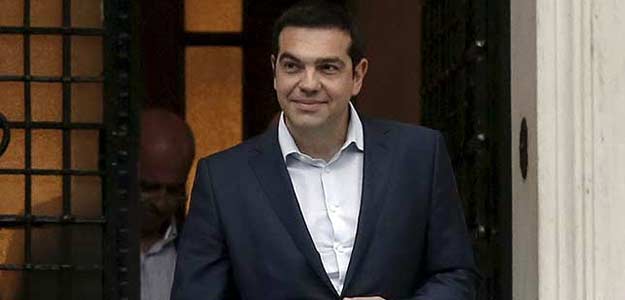Alexis Tsipras, the Greek Prime Minister has done what most people thought would be impossible: the Greek parliament has passed sweeping legislation that will ensure a better and a smoother working of the financial machinery, the first part of which involves austerity measures. The restructuring and overhauling of Greek’s financial system was a condition in the multi-billion bailout package proposed by Greek’s creditors.
The austerity measures sailed through the Greek parliament with 229 votes in its favor against a total of 300 votes. 64 voted the legislation which 6 votes were absent. With the passing of these legislation, Alexis Tsipras seems to have saved the day, but the future of his party hangs in the balance.
Acknowledging that the package will cause hardship, but the lack of any other alternative forced his hands. "I am the last person to shirk this responsibility," he told parliament. Acknowledging a split in the Syriza party, Gabriel Sakellaridis, the government’s spokesperson clarified that there would be no immediate call for new elections.
By passing these legislations, Alexis Tsipras has saved Greece from the brink of bankruptcy and possibly an exit from the European Economy. Thanks to his efforts, 86 billion euros will not flow into Greece and sustain its economy. On the downside Greece will have to endure an increase in value added taxes, adjustment in pension benefits, tighter controls on public spending and an overhauling of its financial systems. It has also agreed to sequester 50 billion euros of public assets in a special privatization fund to act as collateral on the deal.
The Greek parliament’s speaker who is very vocal with his views, termed the move as social genocide. Some scenes of protests were heard outside parliament at the time of the debate in parliament. The former finance minister, Yanis Varoufakis, who was sacked also denounced the deal as "a new Versailles Treaty". The Deputy labor minister as well as the energy minister voted against the bill.
There is rampant speculation that both Panagiotis Lafazanis, the Energy Minister, and Dimitris Stratoulis, the Deputy Labor Minister would not be holding their portfolios once the Greek Prime Minister decides to go in for a reshuffle.
"We support Syriza in government and we support the Prime Minister. We don't support the bailout," said Lafazanis diplomatically.
Tsipras made it loud and clear, that he was supporting this package only because Greece had no better alternative.
"I acknowledge the fiscal measures are harsh, that they won't benefit the Greek economy, but I'm forced to accept them," he clarified.
With Greek’s parliament keeping its part of the deal, the ball is now in Germany’s court so that it can pass legislation that approves the start of the bailout package, so that funds, which is the blood of the economy, will again flow into Greek’s coffers and Greek banks, which were shut as a measure of capital control, can carry out their business.
Eurozone finance ministers are due to hold a conference call on Thursday at 10 a.m. (0800 GMT) to discuss the vote.
Despite objections from Czechoslovakia and Britain, a 7 billion euro loan will be provided to Greece from the European Financial Stability Mechanism (EFSM).
A study conducted by the IMF has concluded that Greece needs more debt relief than what its creditors, especially Germany, is prepared to accept so far. With Greece holding its end of the promise, all eyes are now on Germany to see whether it can honor its promises.
While ruling out any writing-offs, the European Commission has published its own assessment of the Greek scenario. While it has agreed to debt-restructuring it says debt re-profiling is also possible.
The bailout package is much tougher than what most Greek’s anticipated during the July 5th referendum. Most Greeks however want to be part of the European Union family. Many Greeks now see the bailout package as the lesser of two evils.
"We are Europe's bankrupt child and as a child, Europe has been supporting us for five years and told us what we needed to do to get out of this situation," said Yannis Theodosis, a 35-year-old civil engineer. "We did nothing and now we are paying the consequences."
References:
http://www.reuters.com/article/2015/07/16/us-eurozone-greece-idUSKBN0P40EO20150716
The austerity measures sailed through the Greek parliament with 229 votes in its favor against a total of 300 votes. 64 voted the legislation which 6 votes were absent. With the passing of these legislation, Alexis Tsipras seems to have saved the day, but the future of his party hangs in the balance.
Acknowledging that the package will cause hardship, but the lack of any other alternative forced his hands. "I am the last person to shirk this responsibility," he told parliament. Acknowledging a split in the Syriza party, Gabriel Sakellaridis, the government’s spokesperson clarified that there would be no immediate call for new elections.
By passing these legislations, Alexis Tsipras has saved Greece from the brink of bankruptcy and possibly an exit from the European Economy. Thanks to his efforts, 86 billion euros will not flow into Greece and sustain its economy. On the downside Greece will have to endure an increase in value added taxes, adjustment in pension benefits, tighter controls on public spending and an overhauling of its financial systems. It has also agreed to sequester 50 billion euros of public assets in a special privatization fund to act as collateral on the deal.
The Greek parliament’s speaker who is very vocal with his views, termed the move as social genocide. Some scenes of protests were heard outside parliament at the time of the debate in parliament. The former finance minister, Yanis Varoufakis, who was sacked also denounced the deal as "a new Versailles Treaty". The Deputy labor minister as well as the energy minister voted against the bill.
There is rampant speculation that both Panagiotis Lafazanis, the Energy Minister, and Dimitris Stratoulis, the Deputy Labor Minister would not be holding their portfolios once the Greek Prime Minister decides to go in for a reshuffle.
"We support Syriza in government and we support the Prime Minister. We don't support the bailout," said Lafazanis diplomatically.
Tsipras made it loud and clear, that he was supporting this package only because Greece had no better alternative.
"I acknowledge the fiscal measures are harsh, that they won't benefit the Greek economy, but I'm forced to accept them," he clarified.
With Greek’s parliament keeping its part of the deal, the ball is now in Germany’s court so that it can pass legislation that approves the start of the bailout package, so that funds, which is the blood of the economy, will again flow into Greek’s coffers and Greek banks, which were shut as a measure of capital control, can carry out their business.
Eurozone finance ministers are due to hold a conference call on Thursday at 10 a.m. (0800 GMT) to discuss the vote.
Despite objections from Czechoslovakia and Britain, a 7 billion euro loan will be provided to Greece from the European Financial Stability Mechanism (EFSM).
A study conducted by the IMF has concluded that Greece needs more debt relief than what its creditors, especially Germany, is prepared to accept so far. With Greece holding its end of the promise, all eyes are now on Germany to see whether it can honor its promises.
While ruling out any writing-offs, the European Commission has published its own assessment of the Greek scenario. While it has agreed to debt-restructuring it says debt re-profiling is also possible.
The bailout package is much tougher than what most Greek’s anticipated during the July 5th referendum. Most Greeks however want to be part of the European Union family. Many Greeks now see the bailout package as the lesser of two evils.
"We are Europe's bankrupt child and as a child, Europe has been supporting us for five years and told us what we needed to do to get out of this situation," said Yannis Theodosis, a 35-year-old civil engineer. "We did nothing and now we are paying the consequences."
References:
http://www.reuters.com/article/2015/07/16/us-eurozone-greece-idUSKBN0P40EO20150716



















